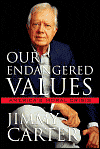Jimmy Carter's 20th book is a tedious meditation about the appropriate uses of moral values in political life--as wisely and humbly exemplified by Himself--and of their misuses under the current Bush administration.
But tedious isn't quite the right word here, because it suggests mere boredom while Mr. Carter's prose manages to be irritating as well. Is there an English-language equivalent to the German Rechthaberei, which loosely translates as the state of thinking and behaving as if you're in the right and everyone else is in the wrong? Yet even such a term doesn't quite capture the sanctimony, the self-congratulation, the humorlessness, the convenient factual omissions and the passive-aggressive quirks that characterize our 39th president's aggressively passive world view. Mr. Carter is sui generis. He deserves his own word.
So, you will agree that he seems to seriously dislike the book, yes? Not to mention the author? Try to put that to the side for now, please...

Our Endangered Values: America's Moral Crisis
...because here comes the part that caught my eye, perhaps because Latin America is in the news right now, or perhaps because I recently read a dynamite speech about the amazing transformation of El Salvador. In any case, the following part of Stephen's review jumped out at me (emphasis added):
Everything about "Our Endangered Values" is wrong, beginning, obviously, with the title. The values Mr. Carter says are "ours" are certainly not mine and probably not yours and therefore, necessarily, not ours. In fact, it is not at all obvious that the things Mr. Carter speaks of even qualify as values, properly speaking, unless you believe that "economic justice" is a value, or you subscribe to Marxist liberation theology (Mr. Carter considers the Catholic priests who practiced this theology to be "heroes"), or you would like to pay your "personal respects" to Syria's dictator (never mind that he just had the prime minister of Lebanon assassinated), or you can think of nothing bad to say about Saddam Hussein except, perhaps, that he is "obnoxious."
How very odd, I thought, that I would read about long-discredited (or I thought it was long discredited) liberation theology in two places at nearly the same time, but coming from entirely different directions. This passage from a speech by former President of El Salvador Francisco Flores was still in my head:
El Salvador was destroyed by 13 years of unremitting violence. Every Salvadoran family had to mourn the loss of at least one of its members. One third of the population fled to neighboring countries. Its infrastructure was devastated, with no resources to reconstruct itself, and more than half of its population lived under the poverty line. At the end of the war in 1992, El Salvador seemed hopeless...
I say hopeless in a literal sense. At the beginning of the war, El Salvador was a deeply Catholic country. However, led by revolutionary priests beginning in the 1970s, important sectors of the Church embraced liberation theology. The Bible was read as a political program that justified armed insurgency. Christ’s teachings were used to justify terrorism.As they sought the protection of the Church in their need for spiritual comfort, our campesino families found that the pulpit had become one more source of violence. They were asked to hate, and told to act violently.
They did neither. These campesinos searched for Christ’s teachings elsewhere. I remember them walking through the narrow pathways of our mountains in those terrible days. The men wore long sleeved white shirts and black trousers, the women long skirts and their hair under white veils. If the guerrillas or the army stopped them, these humble people held a Bible up to the gun barrels that were pointed at them. They were courageous in their silence and though greatly vulnerable, they were immensely dignified. Never in my life have I been prouder to be a Salvadoran.
Well. I guess you can see why I found the contrast jarring.
I am inclined to be more impressed with Flores than Carter, for what it's worth.
Related previous post: Commentary: El Salvador's Secret: Freedom and Opportunity Cure Poverty

4 comments:
Carter, an enigma wrapped in a warped Southern peanut.
Let's not sink into that sort of name-calling if we can help it, eh? Please.
Sorry.
Apology accepted.
Post a Comment